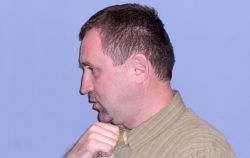|
Interview with the Open World Delegate Gamil Gibadullin
May 13, 2009
 |
| Gamil Gibadullin | Open World civic rule of law delegate Gamil Gibadullin is a journalist, human rights activist, and chronicler of the immigrant and ethnic minority experience in the Republic of Tatarstan, where the majority of the population are ethnic Tatars and are Sunni Muslims. Gibadullin’s delegation, which began their D.C.-area program May 8, looked closely at U.S. assistance to victims of human trafficking. Open World caught up with the delegation as they participated in a roundtable at the Voice of America studios in Washington, D.C. on May 13. Gibadullin was hosted by Open World national grantee Terrorism, Transnational Crime and Corruption Center (TraCCC) at George Mason University and departed the U.S. May 16.
OW: I understand from your profile that you are quite an accomplished journalist and public persona in the Republic of Tatarstan. Can you speak more to what you do and what issues you draw attention to in your work?
GG: I write about the Tatar people and I also write about those who practice Islam and about Turkish issues. I write about ethnic minorities of Russia and new minorities to Tatarstan. So, I deal with two sides of the picture; the concerns of the of the indigenous people of Tatarstan and also the assimilation process of the newer ethnic groups in the area – the immigrants who want to settle down and make a life for themselves in Russia and yet not lose their ethnic identity.
OW: Are there certain organizations or schools in your region where immigrants can send their children to continue learning their native tongue and culture, cultural societies, etc.?
GG: Yes. In Soviet times the Tatar people had a 99.5 percent literacy rate. Because the Soviets were eager for the Tatars to absorb the ideas of the Soviet system, they Tatar language was kept as the language of education, so that people could make this change to Socialism easily. And of course there were other ethnic groups that did not have their own educational system, like the Tatars had. The Soviet system helped those ethnic groups, like the Bashkir and Urdmurt, to open their own national ethnic schools. But over time, this changed and now there are very few ethnically oriented schools.
OW: Is it your personal mission to help the people of Tatarstan and its indigenous groups to come back to their native tongue and religion?
GG: I do not feel that it is my personal mission, but I am helping to report about this issue and give exposure to their desire in the media. As a volunteer, I do quite a bit of social work with these groups.
OW: What is your interest in being a part of this Open World delegation which is in the United States to look at human trafficking issues, the work being done with our different immigrant populations, ensuring that they remain safe as they assimilate into this country? Are you going to write about your experience in the United States?
GG: Since I cover the life of immigrants who come to Tatarstan and the situation in Turkey, I have come across cases of trafficking, sexual exploitation, coercion, etc. Yes, I plan on writing something about my experience in the U.S. The problems of migration and immigration, especially human trafficking and exploitation, are just coming to see the light in Russia and need to be explained, uncovered.
OW: What has left the biggest impression upon you during your time on the Open World Program?
GG: In principle, the issues that we have discussed are not new subjects and there is nothing really that I cannot read about in the Internet. The most important thing to me was seeing the real United States: the kindness, the respect for human rights, and especially the rights if immigrants both legal and illegal – humanitarianism. Basically, the well being of the people I see here.
I had heard, some people told me that, Americans were fat, lazy, and snobbish and so it was so interesting for me to see that this isn’t so. The people here are just like people everywhere!
story archive
|













